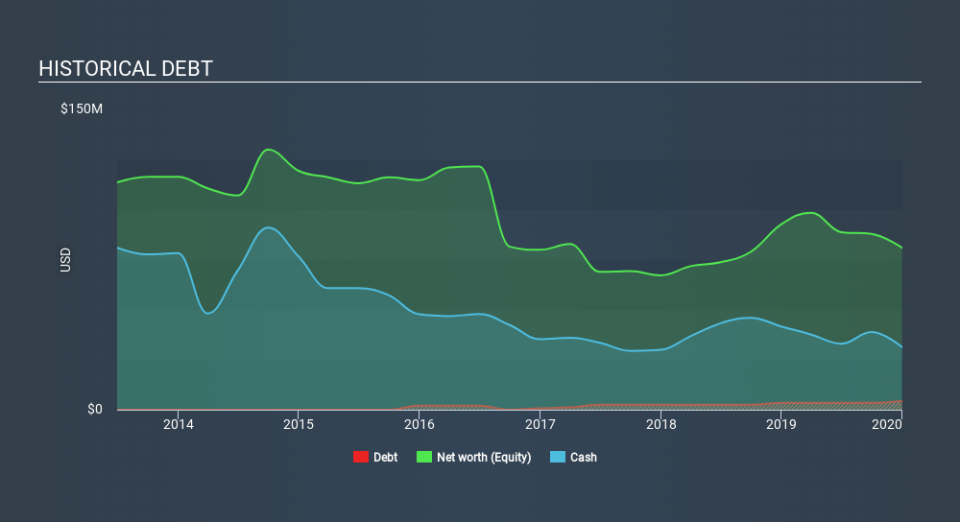Here's Why Genie Energy (NYSE:GNE) Can Manage Its Debt Responsibly

David Iben put it well when he said, 'Volatility is not a risk we care about. What we care about is avoiding the permanent loss of capital. When we think about how risky a company is, we always like to look at its use of debt, since debt overload can lead to ruin. We can see that Genie Energy Ltd. (NYSE:GNE) does use debt in its business. But the more important question is: how much risk is that debt creating?
What Risk Does Debt Bring?
Debt and other liabilities become risky for a business when it cannot easily fulfill those obligations, either with free cash flow or by raising capital at an attractive price. If things get really bad, the lenders can take control of the business. However, a more frequent (but still costly) occurrence is where a company must issue shares at bargain-basement prices, permanently diluting shareholders, just to shore up its balance sheet. By replacing dilution, though, debt can be an extremely good tool for businesses that need capital to invest in growth at high rates of return. When we think about a company's use of debt, we first look at cash and debt together.
Check out our latest analysis for Genie Energy
What Is Genie Energy's Debt?
As you can see below, at the end of December 2019, Genie Energy had US$4.33m of debt, up from US$3.44m a year ago. Click the image for more detail. However, its balance sheet shows it holds US$31.2m in cash, so it actually has US$26.9m net cash.
A Look At Genie Energy's Liabilities
The latest balance sheet data shows that Genie Energy had liabilities of US$72.2m due within a year, and liabilities of US$3.16m falling due after that. Offsetting these obligations, it had cash of US$31.2m as well as receivables valued at US$50.0m due within 12 months. So it actually has US$5.95m more liquid assets than total liabilities.
This surplus suggests that Genie Energy has a conservative balance sheet, and could probably eliminate its debt without much difficulty. Simply put, the fact that Genie Energy has more cash than debt is arguably a good indication that it can manage its debt safely.
In fact Genie Energy's saving grace is its low debt levels, because its EBIT has tanked 21% in the last twelve months. Falling earnings (if the trend continues) could eventually make even modest debt quite risky. The balance sheet is clearly the area to focus on when you are analysing debt. But it is future earnings, more than anything, that will determine Genie Energy's ability to maintain a healthy balance sheet going forward. So if you want to see what the professionals think, you might find this free report on analyst profit forecasts to be interesting.
Finally, a company can only pay off debt with cold hard cash, not accounting profits. While Genie Energy has net cash on its balance sheet, it's still worth taking a look at its ability to convert earnings before interest and tax (EBIT) to free cash flow, to help us understand how quickly it is building (or eroding) that cash balance. Over the last three years, Genie Energy actually produced more free cash flow than EBIT. That sort of strong cash conversion gets us as excited as the crowd when the beat drops at a Daft Punk concert.
Summing up
While it is always sensible to investigate a company's debt, in this case Genie Energy has US$26.9m in net cash and a decent-looking balance sheet. And it impressed us with free cash flow of US$15m, being 143% of its EBIT. So we don't have any problem with Genie Energy's use of debt. When analysing debt levels, the balance sheet is the obvious place to start. But ultimately, every company can contain risks that exist outside of the balance sheet. For example, we've discovered 3 warning signs for Genie Energy that you should be aware of before investing here.
If, after all that, you're more interested in a fast growing company with a rock-solid balance sheet, then check out our list of net cash growth stocks without delay.
If you spot an error that warrants correction, please contact the editor at editorial-team@simplywallst.com. This article by Simply Wall St is general in nature. It does not constitute a recommendation to buy or sell any stock, and does not take account of your objectives, or your financial situation. Simply Wall St has no position in the stocks mentioned.
We aim to bring you long-term focused research analysis driven by fundamental data. Note that our analysis may not factor in the latest price-sensitive company announcements or qualitative material. Thank you for reading.


